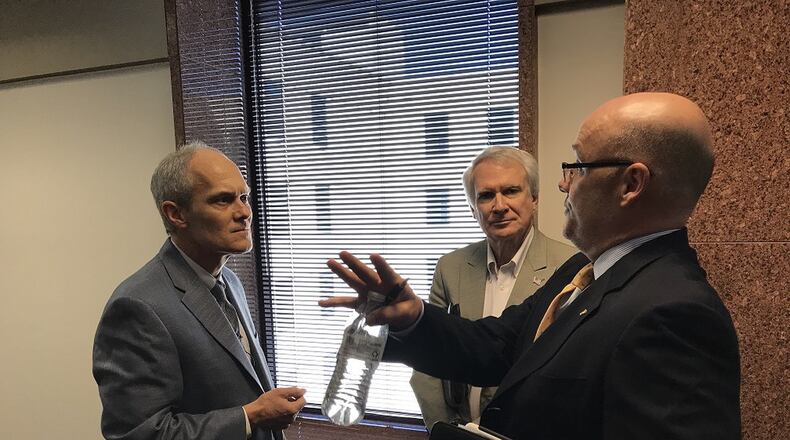The Decatur city attorney has asked the Attorney General’s office to look into whether members of the Georgia Immigration Enforcement Review Board have overstayed their term in office and should be removed.
In his letter, Brian Downs said five of the seven members have served since the board’s creation in 2011, despite a state law that limits members to two terms of two years each.
“If these board members are not supposed to be serving under the law, then they need to step aside,” Downs said in an interview Monday.
It is the latest development in the city's fight against Lt. Gov. Casey Cagle's accusation that Decatur is violating state laws outlawing "sanctuary" cities.
The letter singles out Chairman Shawn Hanley and board member Phil Kent, both outspoken activists for tighter immigration controls, for replacement. Hanley and Kent were appointed by Gov. Nathan Deal.
But Downs also notes Cagle appointees Boyd Austin and Coweta County Sheriff Mike Yeager, along with Moultrie farmer Terry Clark, who was appointed by House Speaker David Ralston, have also served since 2011 without ever being reappointed.
“Expedited action on this situation is critical,” Downs said. “The IERB has multiple pending cases in which each of these individuals have no legal right to participate.”
Cagle filed a complaint against Decatur in November claiming that by prohibiting police from holding suspected illegal immigrants solely on a request from U.S. Immigration and Customs Enforcement the city broke a state law forbidding "sanctuary cities." Cagle filed the complaint from the lieutenant governor's office, but it came amid his campaign against Secretary of State Brian Kemp for the Republican nomination for governor.
Both Cagle and Kemp sparred over who could be toughest on immigration, among other issues. Kemp defeated Cagle in a primary runoff July 24.
Decatur has denied its policy violates the state law. Downs has repeatedly said Decatur is not a sanctuary city in sometimes heated exchanges with immigration board members.
In April, the city sued the immigration board claiming multiple violations of Georgia's open meeting and open records laws. The suit claims the board met regularly without public notice and withheld documents that should be made public, among other charges.
In May, the board released a draft opinion siding with Cagle, while the city filed a complaint with the state ethics board accusing Cagle of using his taxpayer-funded office to file the complaint for the benefit of his gubernatorial campaign.
Kent, one of the board members named in the letter, said he was unaware of Downs’ complaint and said he would wait to hear what the Attorney General’s office decided before commenting. The Attorney General’s office acknowledged receiving the letter but had no comment Monday.
Georgia law clearly states that members of the immigration board are appointed for a two-year term and “may be appointed to an additional term.” Interestingly, the law also states board members serve “until their successors are duly appointed and qualified.”
Downs said the law’s intent is clear that members are to serve, at most, four years.
“The people who are presiding over this … need to step aside,” he said.
Cagle could be placed in an awkward position. Should the current board members be forced to step aside, Cagle would be in the position of appointing new members to a board where he has an open complaint.
Deal’s position is slightly less awkward, but politically sensitive. Immigration is a hot topic in the race to choose his successor, placing any appointments to the board in Deal’s waning months under heightened scrutiny.
Stacey Abrams, the Democratic candidate for governor, has made “immigrant justice” a plank in her campaign platform.
“My soul rests with those seeking asylum and refuge, with new Americans, naturalized citizens, and all those on the long, arduous path toward citizenship,” Abrams writes on her campaign website.
In contrast, Kemp promises an extremely tough stance on illegal immigration, promising to amass a cross-agency database to “track criminal aliens” and “streamline deportations from our jails and prisons.”
It is not uncommon for members serving on the dozens of citizen-led boards in state government to stay beyond their appointed terms. But few boards have as much potential power to investigate if state and local officials properly enforce immigration laws and issue fines or withhold state appropriations to force compliance.
In a heated hallway conversation in June, Hanley, the board chairman, accused Downs of attempting to tear down the board rather than focusing on the Decatur policy, adding “all you do is file litigation on technicalities.”
Downs said his most recent complaint against the board is no legal loophole. It’s a fundamental problem in the system, he said.
“What if Gov. Deal was to stay over term and continue to serve?” he said. “That’s not a loophole.”
The story so far
Previously: Last November, Lt. Gov. Casey Cagle accused Decatur of breaking a state law forbidding sanctuary cities by prohibiting police from holding suspected illegal immigrants solely on a request from U.S. Immigration and Customs Enforcement. Cagle filed a complaint with the Georgia Immigration Enforcement Review Board.
Recently: In April, Decatur sued the immigration board for violating the state's open meetings laws.
Now: Decatur's attorney says five of the seven immigration board's members are serving on expired terms.
About the Author
Keep Reading
The Latest
Featured





